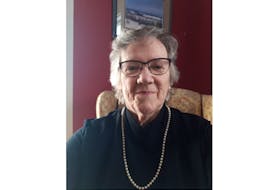For years, Connie MacPherson convinced herself that it was her condition preventing weight loss.
"When I got married aged 23, I wore a Canadian size five in clothes. I had a child when I was 30, and a few years after, I got diagnosed with underactive thyroid disease. The weight just crept up and, suddenly, I became around forty pounds heavier," she said.
The Charlottetown, PEI native tried various diets, losing a few pounds, and then finding an excuse to stop. She told herself her body was incapable of losing weight - until tragedy struck when MacPherson and her husband, Dave, were living in Ontario with their son, Sam.
"Dave worked as a sales coach at the Royal Bank, and I worked as a bank manager with T.D. In November 2016, Dave died unexpectedly of a heart attack. He was 57, and I (was) 50."
Losing her husband propelled MacPherson into a place she never thought she could be.
"We had lots of plans for the future, and then everything changed. It was catastrophic," she said.
"A few months later, I decided I could not stay with the bank, and while it is a great company to work for, it was not me. I was prediabetic. I lost my parents to heart disease and cancer because it runs in my family, and all these health factors became an incentive to change my life – dramatically – for my son."
Shaken to the core over her husband's death and wanting to regain her confidence and ultimately her life, MacPherson joined Ewyn Weight Loss Studios in Chatham, Ont.
This time, she was not going to quit.
Chronic disease
New obesity clinical practice guidelines (C.P.G.) were released last month. Obesity is a complex chronic disease that cannot be defined by one's weight or size (B.M.I.), but whether a person's excess adiposity (body fatness) impairs their health.
Sara Kirk, professor in Dalhousie's School of Health and Human Performance and scientific director of the Healthy Populations Institute, said that we need to focus on healthy eating and movement behaviours rather than focusing on weight as an outcome.
"By labelling obesity – as defined by excess adiposity that impairs health, not by an arbitrary measure like weight or body mass index – as a disease, we can provide evidence-informed supports for people,” said Kirk.
"It is a hugely different way of thinking about obesity, which will take some time to be understood.”
MacPherson can understand that.
"There is a quiet bias on people with obesity, and it should not be a stigma. Those fighting obesity deserve as much empathy as anyone else suffering from a disease. To lose weight takes a lot of work and support, and some people do not have support behind them,” she says.
West-east gradient
Kirk, a vocal advocate for a national school food program, said there is a known west-east gradient in Canada's chronic diseases, with people living on the West coast having better health than those on the East.
"The reasons are quite complex, including weather patterns, ageing demographics, poverty, access and culture are all part of the mix. It seems paradoxical that people with obesity are also likely to experience poverty," she said.
Foods that are energy-dense and nutrient-poor tend to be cheaper and more available than fruits, vegetables, or whole foods.
"The Atlantic provinces typically have higher rates of food insecurity, particularly among families. Think about it – if you have hungry mouths to feed and a limited income, would you buy chips or apples? " asked Kirk.
"Bottom line is that if we want a healthy population in this province or region, we have to create the conditions that make it easy to adopt the behaviours necessary for good health. Make it easy to be physically active, afford to eat healthy, nutritious foods, achieve good mental health, etc. These determinants of health are a significant factor in determining our abilities to adopt health-promoting behaviours necessary to prevent chronic diseases (which are on the rise)."
Helping others

In 2018, MacPherson moved back to P.E.I. and – after losing weight herself – opened her own Ewyn Weight Loss Studios franchise in Charlottetown. Since opening, countless people have found motivation, support, and accountability to transform their lives. Alicia Roberts is one of them.
At five-foot-seven, Roberts weighed 263 pounds.
"The way I got there was through emotional eating. Our society makes food the centre of everything – we celebrate special occasions with food, eat when we are sad or happy, with friends, family," she said.
"I grew up with a single mom, and it was more affordable for us to eat chicken nuggets and fries than fresh salads. We took Mr. Noodles to school for lunch and ate a lot of sugar and processed stuff. It was all we knew, so we craved that food."
Roberts says she had "no energy" and was keen to change her lifestyle.
"First, losing weight was the motivation for my kids and, second, my cousin getting married and asking me to be a bridesmaid," she said.
"It's terrifying to acknowledge you have a problem," added Roberts. "Imagine how embarrassing it is to admit to someone that you can not stop eating. I used to hide my eating from people, almost like hiding a drug habit."
Roberts went on to lose 87 lbs in total and now helps other women and men change their overall health – both mentally and physically – as the manager, director, and health coach of Ewyn Weight Loss Studios in Charlottetown.
"I sobbed with joy when I stepped onto the scales and saw the outcome of all that hard work," she said.
More to be done
While people have a choice or personal responsibility if they wish to lose weight, many decisions are dictated by what is available, said Kirk.
"In essence, healthy behaviour is abnormal because we live in what I call a health-disrupting environment."
Investment needs to be made in the East Coast communities to make them more vibrant, healthier, and more resilient.
"We only invest around two per cent of provincial sickness care budgets into public health. Much of that already small amount of funding gets diverted to infectious diseases (like COVID-19) rather than non-communicable (or chronic) diseases like obesity, diabetes or heart disease,” Kirk said.
While P.E.I. recently introduced a provincial healthy lunch program in schools in January, more needs to be done to make healthy behaviours the default across the East Coast and farther.
Chronic diseases are on the rise, causing a burden on the health system.
“If we only focus on obesity, we ignore the conditions (poverty, accessibility, culture, etc.) that impact us all and lead to these increased rates of chronic diseases,” said Kirk.
"We need stronger public policies, environments that support health rather than hinder it and limits on corporations that actively undermine health, like the food and automotive industries, which governments are often unwilling to do."
Clinical practice guidelines key points:
- Obesity is a prevalent, complex, progressive, and chronic relapsing disease, characterized by abnormal or excessive body fat (adiposity), impairs health. This does not mean that all people with excess adiposity will have health impairments – a fundamental shift in how we view people with obesity.
- People living with obesity face substantial bias and stigma, contributing to increased morbidity and mortality independent of weight or B.M.I.
- The new C.P.G. reflect substantial advances in the epidemiology, determinants, pathophysiology, assessment, prevention, and treatment of obesity, and shifts the focus of obesity management toward improving patient-centred health outcomes, rather than weight loss alone.
- Obesity care should be based on evidence-based principles of chronic disease management, validate patients' lived experiences, move beyond simplistic approaches of "eat less, move more," and address obesity's root drivers of obesity.
- People living with obesity should have access to evidence-informed interventions, including medical nutrition therapy, physical activity, psychological interventions, pharmacotherapy, and surgery.








